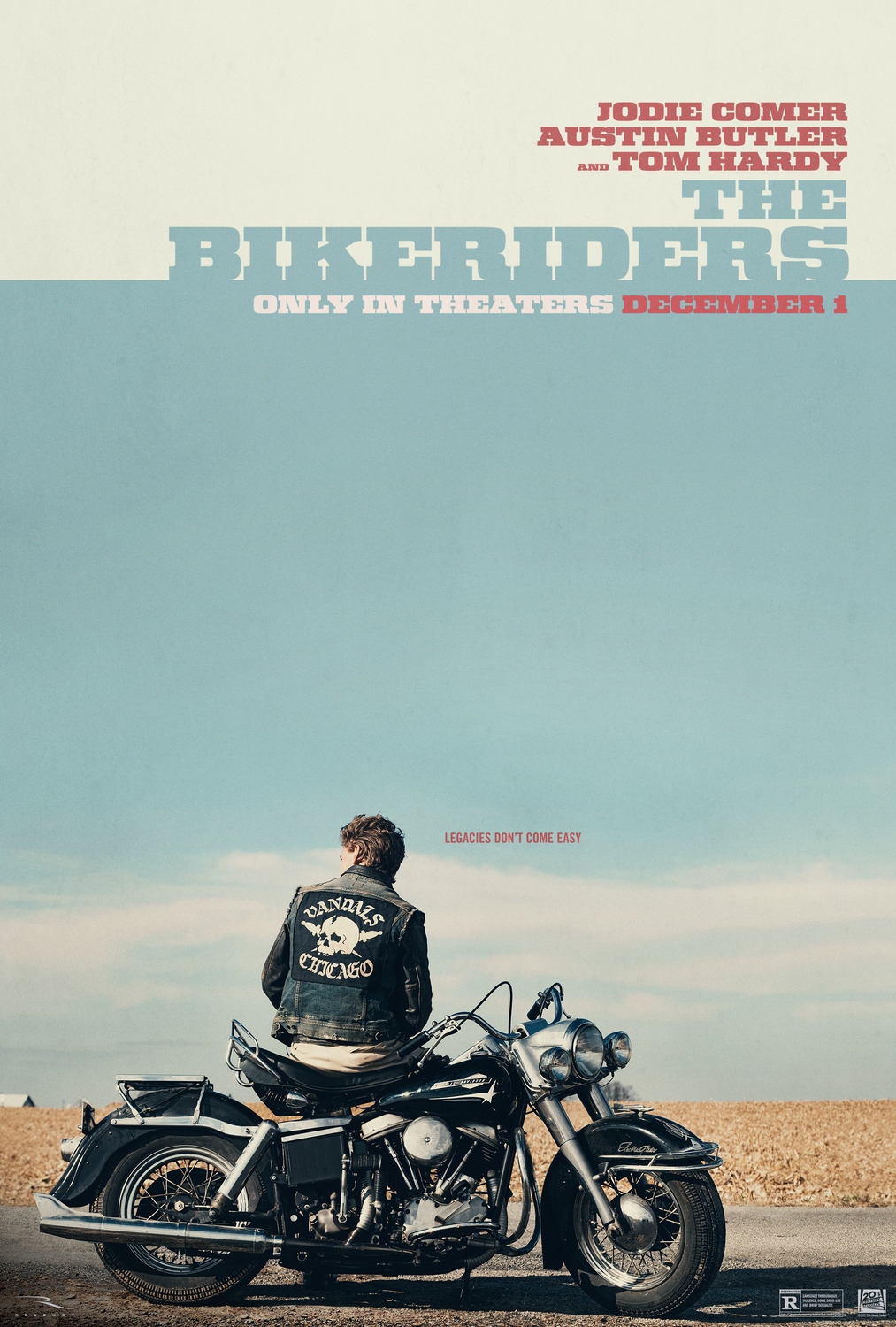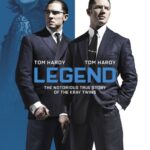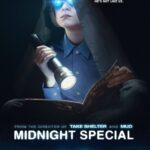Director
Jeff Nichols
Starring
Jodie Comer
Austin Butler
Tom Hardy
Recounted through a series of reflective interviews, we see the rise and fall of the Vandals Motorcycle Club during the late 60s and early 70s. Told almost entirely from the perspective of Kathy [Comer] and her introduction, and later peripheral induction, to the club. But it’s not exclusively told from a single POV, as we also follow the exploits and dynamic between the club leader, Johnny [Hardy] and wild canon, Benny [Butler].
From the outset – in fact, within the first half an hour – we’re offered up an entertaining and compelling narrative. But the story then starts to meander. And yet, this oddly works for the film as a whole; essentially slowly unfolding without clear drive or purpose. Simply stating facts and introducing folks in a dreamlike haze. It’s only when the film concludes, around the two hour mark, that we’re treated to photos of the real club, and we start to get a clear impression of just how attentive the production crew have been in order to capture the visual authenticity.
In a sense, there’s a real Goodfellas energy, as the story cuts back and forth between key events in the club’s history. But again, that romanticised, murkiness constantly impedes the story’s progression. We get loose snippets of the mindset that drew these blue collar workers to the club, and the formative bonds that they forge. But given how aimless the tale is, the turn which sees the club deviate from its original intentions, comes a little out of nowhere. To reiterate, this is not a byproduct, but an intended scripted choice. Nichols has crafted this story to feel like a fragmented recollection. We’re meant to be scratching our heads as much as the tale’s chronicler when we’re served a Carlito’s Way style blindsiding from the young up-and-comers.
While the cinematography, production design, hair, make-up and costumes are all working hard to evoke the feeling of this rag-tag ensemble, nothing would connect if the performances were not as central as they are. That said, it’s never entirely clear who’s story this is; so let’s break each main contender down. Firstly there’s Comer as the audience surrogate. The film opens with her first meeting the club and being repulsed, only to warm to them over time and quickly fall for Benny. Comer’s whole presence is thoroughly refreshing; with her heightened performance nicely complementing the drab guttural mumblings of the bikers themselves.
Speaking of which, let’s talk about Johnny and Benny. The film opens on Benny getting assaulted for refusing to take off his jacket. But the man is so unknowable, viewed from others’ perspectives, that it’s hard to say he’s the main character or driving force. We see why people are invested in him but never truly understand or connect with him. Finally you have Johnny as a disenfranchised trucker who was gripped by the whole vibe of The Wild One and decided to form the club to capture that free-spirit mantra. But, in reality, while he’s a clearly respected leader, he never has the apathetic “don’t give a shit” cool that Benny effortlessly possess. In truth, there is no central character, simply the unrequited love against the backdrop of this group of misfits: Kathy loves Benny, Johnny loves Benny, yet Benny can’t truly love either because Benny loves bikes.
As a side note, it’s worth mentioning just how stacked this cast is. Every small role is either fleshed out with people who look plucked from the past, or surprisingly big names in fairly unassuming roles – to the extent that you look through the cast list and often exclaim, “Wait, Paul Sparks was in this film? Where was he?” But for a movie about a collection of odd characters, this feels fitting. I wouldn’t be surprised if Nichols simply went through old photographs of the Outlaws MC and fixated on a handful, questioning “What’s their story?” before crafting a scene or encounter that sums them up from that inspiration.
Determining whether this movie is good or not, depends entirely on your appreciation of Nichols’ work. To date he has created several slow-burn character studies that are less concerned with narrative events and more on the impact this life has on these out-of-reach figures. The trouble with The Bikeriders, however, is that it doesn’t give us the same heart and reflective message as something like Easy Rider. We’re shown this club and the various members in it but it never truly captures the appeal or justification. In fact, we never see the ultimate zenith of the club, they’re simply introduced and then arbitrarily roll along until it all falls apart and pivots to more severe organised crime. In a way, I was reminded a little of Legend – another Hardy led piece that should have been a lot stronger than it was. Some fantastic performances and standout moments but the whole thing doesn’t string together as well as it should, leaving audiences arguably entertained but somewhat disconnected.
Release Date:
21 June 2024
The Scene To Look Out For:
One of the big aspects of the club, other than simply riding around, are organised picnics. These are group meet-ups where the club members and their families get together to talk bikes, sit around, eat, drink, and generally socialise. This is the more innocent aspect of the club that it was founded on. And, as we see the collective devolve, these picnics go from family-oriented gatherings to violent sexual binge parties in abandoned houses. As such, in a film with seemingly little rudder, these interludes offer us a distinct look at how the club is getting out of hand.
Notable Characters:
There’s an old Hollywood anecdote that James Dean loved The Wild One and was exceptionally keen to meet with Marlon Brando. But upon meeting him, it became clear the two actors were different in nature. Not only in their temperament but how they approached the craft. The reason I bring this up is because Butler and Hardy have a chemistry very reminiscent of Dean and Brando. One is graceful and smooth with a deep injection of disinterest in the world he finds himself in. He has a solo passion and that defines him, but outside of that, he keeps others at a distance. While the other is a focused ball of determination who commands respect but is hampered by fatigue and dissatisfaction.
Highlighted Quote:
“I guess everybody needs somebody to pick on. Can you imagine anyone better than us?”
In A Few Words:
“An interesting study but one that doesn’t break enough new ground to really lodge itself in your memory.”
Total Score: 3/5

![The Red Right Hand Movie Reviews [Matthew Stogdon]](https://reviews.theredrighthand.co.uk/wp-content/uploads/2021/12/cropped-header1.png)



